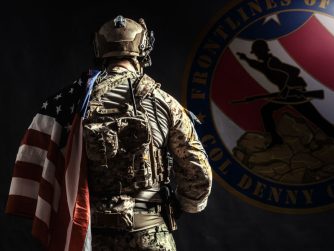This is the third in a four-part series on the danger to our nation if we implement the new policy of allowing women in close-combat units. In previous weeks we discussed that women do make very good soldiers and can handle combat. However, they do have hygiene and other sanitation needs different than men. Further, we noted that professional sports teams are all male—if women can handle the strength and endurance requirements of men—why is that so? We also discussed the physical differences between men and women—women are smaller and frailer and are unavailable for duty due to health issues much more than men. And we dealt with the devastating issue of sexual tension in units.
Continuing, there’s the issue of rape. I personally know some military women who were dating military men and the result was date-rape. It’s hard to prove as it’s all “he-said-she-said”, so the result is somewhere between very hurt feelings and hatred and a total lack of trust, and, maybe, gossip—and definitely lower unit effectiveness.
Then there’s just plain rape; put men and women together, particularly under stress for extended periods, and this horrific crime can and does result. Indeed, our military is experiencing a huge increase in rape right now. Our Air Force says it’s getting out of control—and few Air Force folks are in close combat units. Our military has been unable to find any solutions to this problem, and they’re really trying to solve it. Of course, they’ve missed the obvious—reducing the number of women in our military—but that wouldn’t be Politically Correct. For some reason the bright egg heads in charge think that we can educate young people who are away from home for the first time not to be active sexually, whether it be dating or raping. In case you haven’t noticed, it doesn’t work.
The sea-going Navy has been taking women on ships for years. While they will not admit it officially, pregnancy is a serious problem on a ship; what does one do with a pregnant woman on a six or nine month cruise who can’t do her job?—but the job needs to be done—how does that happen? What do these extra duties for other sailors do for morale? Further, while these sailors are rarely in close combat situations, they are locked up together on that ship—there’s no way to avoid being in contact with someone you wish to avoid—and no problem being around someone you want to be around. Our navy has been relieving Commanding Officers and Executive Officers at a rate of two per month for years—and very, very often, sex is at least a part of the reason; inappropriate sexual relationships are not just for the young. One wonders why neither the Department of Defense nor the media have even noticed.
By the way, all these issues would also impact the unit if homosexual soldiers of the same gender end up around each other. The real issue is sexual tension. We do know that in the past year the military has reported a severe increase in male-on-male fights; I wonder if there’s any relationship.
Here are a few true stories of females who were allowed into traditional male jobs. Note, that it took a while to find out that the female wasn’t happy doing, and ultimately couldn’t do, the job—do we want to find out after a month or two of close combat that one of our team members can’t perform? Yes, it happens to males, too, but much, much more rarely.
A good friend reports that when he was XO of an aviation battalion women were allowed to be crew chiefs on helicopters. They made special space in the barracks and provided a wall with a door that separated their area. The wall lasted 3 days before the guys knocked it over. Then we placed a female CQ there and guys stayed away much to the girls chagrin. Of the 12 female crew chiefs that were assigned, 11 lasted about 2 months. All asked for an MOS (Military Occupation Specialty) switch because 1) they couldn’t keep carrying their 60 pound tool box to the aircraft from the hangar, 2) they had too much pain at certain times each month to do heavy work and go through the rigors of preflight and post flight inspections and repairs, especially in 15 degree weather at 3 AM, 3) they didn’t know that the guys would be pissing under the tail boom during refueling operations 4) they missed too many meals when we were lifting infantry guys all day and night, 5) they didn’t know that flying would be an all-day/all-night activity.
Speaking of Army helicopter maintenance folks, women were first deployed in combat in that role during the first Gulf War. Because most of the airfields were sand areas, tool boxes could not be pulled on their wheels—they had to be carried, and the women couldn’t do it. Yes, they could maintain the chopper, but they couldn’t get their tool box there without a man to help them; this is not combat effective.
Add the sexual tension that we discussed last week and we have a unit that is virtually ineffective. It’s not that women are bad—they’re wonderful and very capable—but they’re not men. But there is no room for excuses in combat; ineffective units result in excessive casualties and a defenseless nation. I’ll continue this topic next week.



